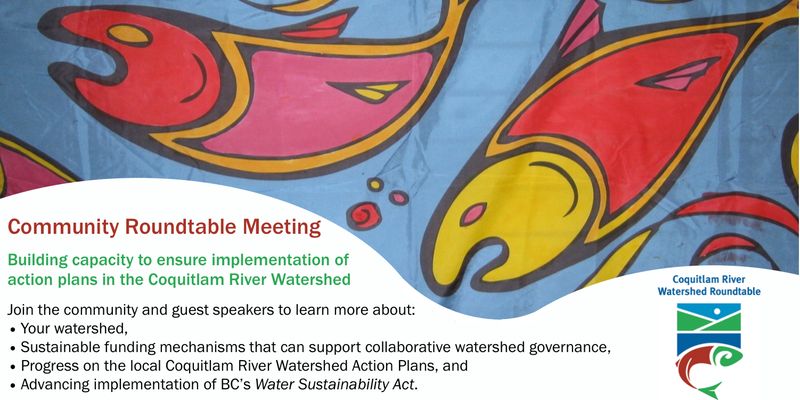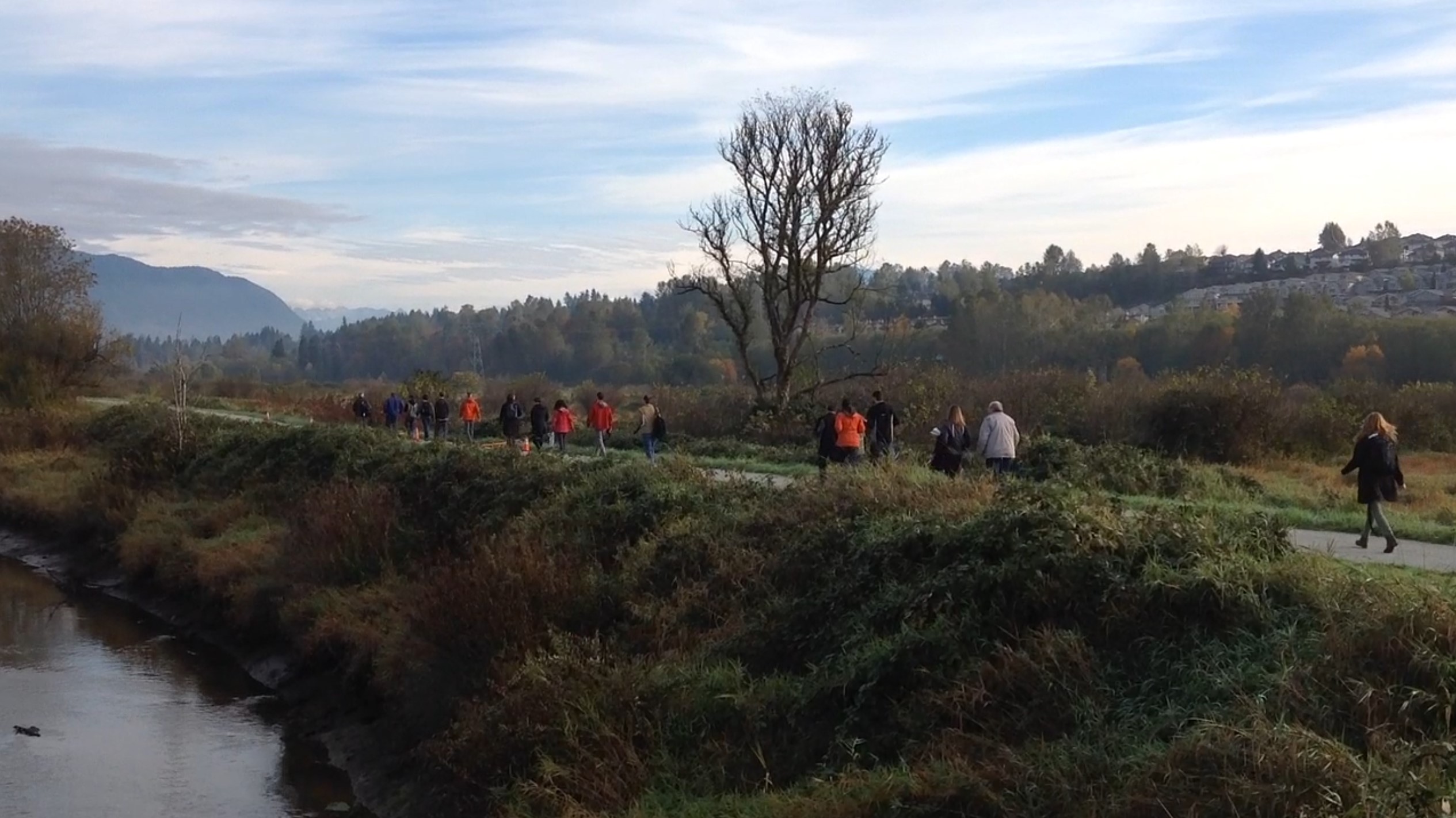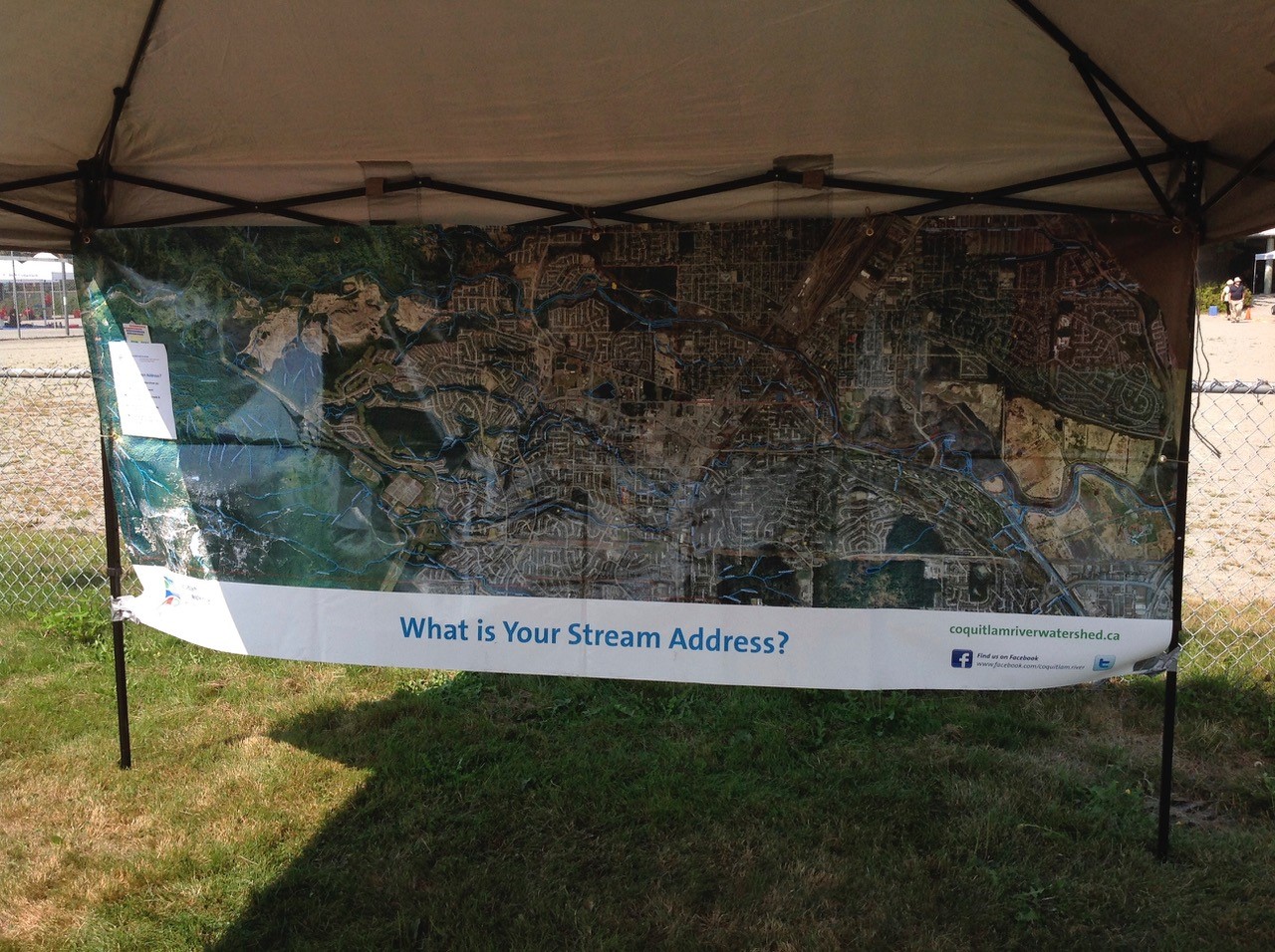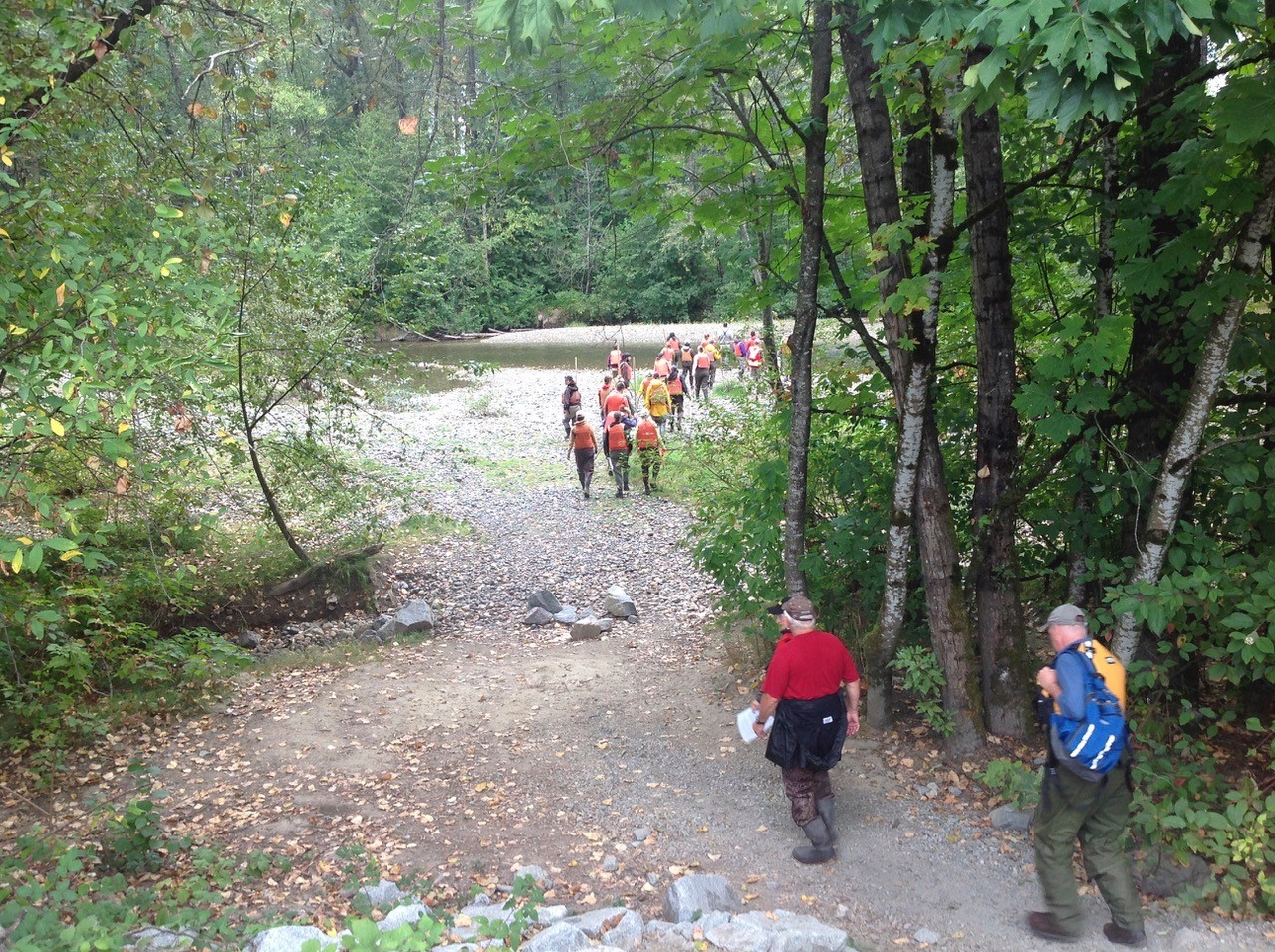Coquitlam River Watershed Roundtable: Community Meeting – a Call to Action for Governments, First Nations, Private Stakeholders, Watershed Governance and Policy Experts, and Members of the Public (June 10, 2017)
Note to Reader:
The Coquitlam River Watershed Roundtable has made significant advancements under its collaborative model. One highlight is the development of a unique watershed plan. With the development and launch of the Lower Coquitlam River Watershed Plan in 2015, the Roundtable is poised to implement strategies for action in partnership with local municipalities, the regional government, First Nations, and private/public stakeholders to support watershed sustainability.
The Community Roundtable Meeting taking place on June 10, 2017 in Port Coquitlam will share multi-sector, public, and expert perspectives on local watershed governance, sustainable funding mechanisms, and collaborative decision-making. The Roundtable’s draft Business Proposal will be shared with the public for the first time.

For event details and to RSVP, visit FREE REGISTRATION
Coquitlam Community Roundtable Meeting is an opportunity to explore sustainable funding mechanisms for watershed initiatives in BC
“At the heart of building the capacity and resilience of community groups seeking to implement local watershed initiatives is the need for sustainable funding,” states Melissa Dick, Coordinator of the Coquitlam River Watershed Roundtable.
 “Since its establishment in 2011, activities of the Coquitlam River Watershed Roundtable have been supported by a fluctuating budget consisting of grants, partner donations, and in-kind contributions on a project-to-project basis.
“Since its establishment in 2011, activities of the Coquitlam River Watershed Roundtable have been supported by a fluctuating budget consisting of grants, partner donations, and in-kind contributions on a project-to-project basis.
“With the development and launch of the Lower Coquitlam River Watershed Plan in 2015, the Roundtable is poised to implement strategies for action in partnership with local municipalities, the regional government, First Nations, and private/public stakeholders to support watershed sustainability.
“To ensure the long-term engagement of the Roundtable in watershed initiatives and planning, sustainable funding sources are required to provide stability, long-range planning, and leverage of additional donations to see the plan through implementation and beyond,” emphasizes Melissa Dick.
 “A long-standing, multi-year source of funding is critical to sustain watershed-related activities,” states Steve Litke, Senior Program Manager of Watersheds and Water Resources with the Fraser Basin Council.
“A long-standing, multi-year source of funding is critical to sustain watershed-related activities,” states Steve Litke, Senior Program Manager of Watersheds and Water Resources with the Fraser Basin Council.
Multi-Year Funding
“The Real Estate Foundation of British Columbia (REFBC) is providing multiyear funding to the Roundtable to research and identify a sustainable funding strategy and to participate in peer-to-peer knowledge sharing opportunities to connect with initiatives across the Province, share lessons learned, and contribute to the range of experience across regions,” explains Melissa Dick.
Draft Business Proposal:
“A draft Business Proposal has been prepared by the Roundtable and critiqued by leading experts in the fields of watershed governance and funding/delivery models,” continues Melissa Dick.
“The draft Proposal will be shared with the public for the first time at the upcoming Community Roundtable meeting, and discussions will be lead by experts to identify the opportunities and challenges unique to the Coquitlam River watershed.
Exploring sustainable funding mechanisms for watershed initiatives
The Roundtable’s draft Business Proposal draws on examples of successful implementation and delivery of sustainable funding mechanisms in other watersheds, such as:
- Drinking Water & Watershed Protection (DWWP) program in the Regional District of Nanaimo (RDN) – funded by a parcel tax.
- Shuswap Watershed Council in the Columbia Shuswap Regional District (CSRD) – funded by a parcel tax.
- Shawnigan Basin Society in the Cowichan Valley Regional District (CVRD) -receives funds annually which are earmarked from water utility fees.
“The Roundtable is seeking to secure core funding to cover ongoing costs and to support the leverage of additional funds,” states Melissa Dick. “The Community Roundtable meeting will be an opportunity to hear from experts on successes and challenges in regions across BC.
“We want to hear what Roundtable participants think of our draft Business Proposal and what they see as being feasible in our local Coquitlam River watershed. What works here will not be the same as what works in another watershed.”
A Reliable Source of Funding
 “In the Nanaimo region, our parcel tax function provides us with a reliable long-term funding source to enable our work related to water sustainability education/outreach, data-collection/monitoring, and planning/policy development for our region,” states Julie Pisani, Coordinator of the DWWP at the Regional District of Nanaimo.
“In the Nanaimo region, our parcel tax function provides us with a reliable long-term funding source to enable our work related to water sustainability education/outreach, data-collection/monitoring, and planning/policy development for our region,” states Julie Pisani, Coordinator of the DWWP at the Regional District of Nanaimo.
“This in turn magnetizes other partners and resources, to collaborate on watershed initiatives with us, as we are recognized as an equipped, dependable and long-term player,” continues Pisani.
Diverse Sources of Funding
 Zita Botelho, Project Manager for the Sustainable Funding for Watershed Governance Initiatives, stresses the need for watershed groups to seek diverse sources of funding.
Zita Botelho, Project Manager for the Sustainable Funding for Watershed Governance Initiatives, stresses the need for watershed groups to seek diverse sources of funding.
“Diversity is key in sustainable financial planning, and we have already seen examples of what is possible when there is a strong partnership between, for example, a city and a watershed group. It is important to consider a blend of funding mechanisms. Resilience comes from diversity.”
Implementing elements of the Lower Coquitlam River Watershed Plan, opportunities and challenges
“At the upcoming Community Roundtable meeting, there will be a presentation reporting on the status of the implementation phase of the Lower Coquitlam River Watershed Plan by the Roundtable and its partners, as well as anticipated next steps,” foreshadows Melissa Dick.
“Recently, support from the development community was secured in the form of cash donations to advance on key strategies for action and the commitment from representatives to participate participation in scoping meetings with members of the Roundtable.
“This is an opportunity to strengthen the relationship between sectors represented on the Roundtable and developers in the watershed and for information sharing across groups.
“The collaborative, knowledge-sharing, and inclusive approach of the Roundtable has been central to its past successes and will continue to be a key characteristic as it works to implement elements of the Watershed Plan in alignment with efforts by the local municipalities and regional government,” states Melissa Dick in providing an overall perspective.
Collaboration Benefits All
 “One way to enhance the capacity of local governments to assess impacts is to work collaboratively, with other local governments, provincial and federal governments, government agencies, First Nations, the academic community and professional associations, many of which are already working to understand how the climate and ecosystems are changing and what the impacts will be. A number of these groups are already working with various local governments in BC,” states Deborah Carlson, Staff Counsel with West Coast Environmental Law.
“One way to enhance the capacity of local governments to assess impacts is to work collaboratively, with other local governments, provincial and federal governments, government agencies, First Nations, the academic community and professional associations, many of which are already working to understand how the climate and ecosystems are changing and what the impacts will be. A number of these groups are already working with various local governments in BC,” states Deborah Carlson, Staff Counsel with West Coast Environmental Law.
What does the new Water Sustainability Act (WSA) mean for local watershed governance?
“The Roundtable is keeping a close eye on developments of the regulations associated with the new Water Sustainability Act and potential opportunities to support local watershed governance initiatives. At the Community Roundtable meeting, experts will provide a presentation on the WSA and will guide a conversation on the topic,” states Melissa Dick.
A Robust Framework
 “B.C.’s Water Sustainability Act, in effect since February 2016, presents key new opportunities for communities, provincial and local governments, and First Nations to advance freshwater protection in B.C.,” says Rosie Simms, Water Law and Policy Researcher/Coordinator with the POLIS Water Sustainability Project.
“B.C.’s Water Sustainability Act, in effect since February 2016, presents key new opportunities for communities, provincial and local governments, and First Nations to advance freshwater protection in B.C.,” says Rosie Simms, Water Law and Policy Researcher/Coordinator with the POLIS Water Sustainability Project.
“With provisions including the potential for innovative water sustainability plans, a new ability to formally delegate decision-making under the Act, and enhanced protections for environmental flows, the WSA—if fully implemented through a partnership approach—can provide a robust framework for freshwater management and governance in the province,” adds Simms.
Local Control
“When a community’s water supply is impacted, it is local people who suffer the consequences,” stresses Coree Tull, Organizing Director with the Canadian Freshwater Alliance.
 “Local communities should have control over decisions that affect their waterways. If implemented with care and rigour, there are many opportunities for the Water Sustainability Act to empower local control.
“Local communities should have control over decisions that affect their waterways. If implemented with care and rigour, there are many opportunities for the Water Sustainability Act to empower local control.
“For example, the Act sets out a framework for the creation of water sustainability plans that could allow local community members–including First Nations, local government officials, community organizations, and various stakeholders–to prepare legally binding plans that ensure watershed health.
“The Act could also enable collaborative decision-making models, which could provide resources for place-based solutions to local water challenges.
“Provisions for local control are incredibly important. Local communities know and care about their watersheds, and they are the ones who have the know-how and drive to protect them,” adds Tull.





